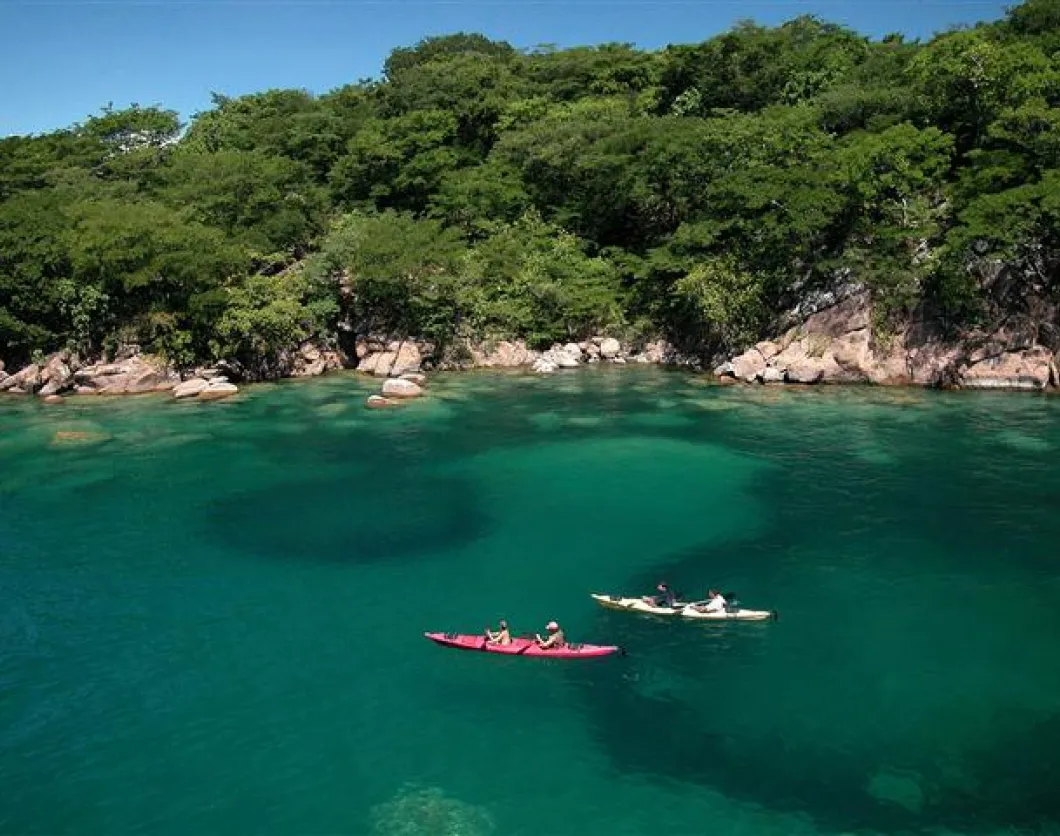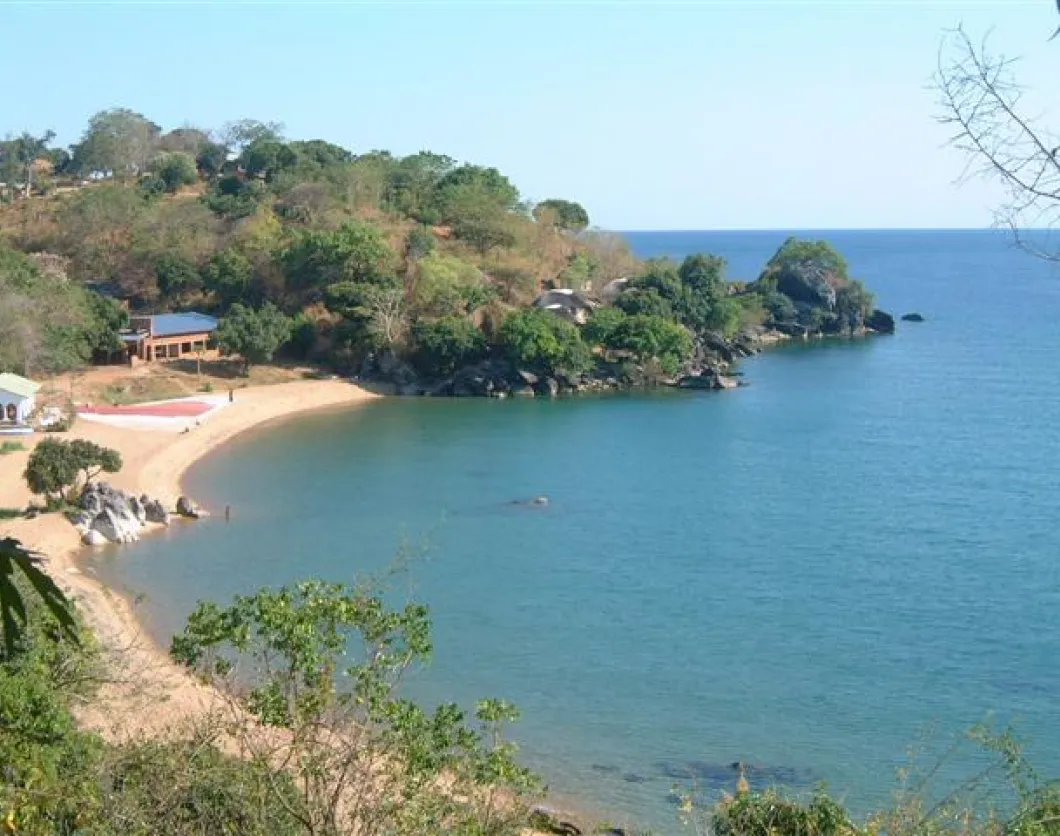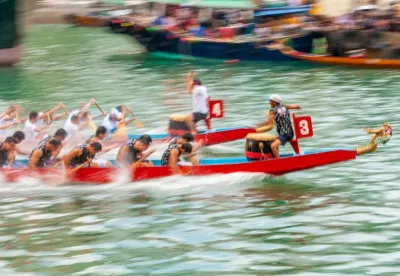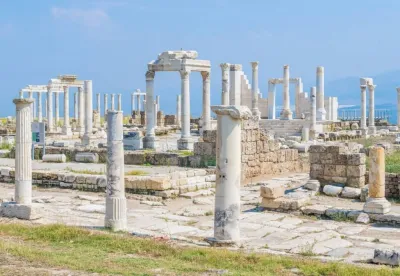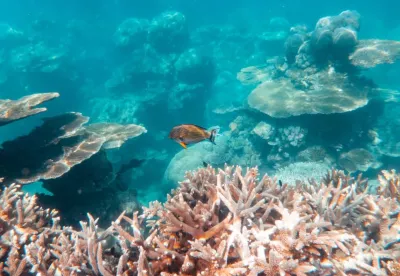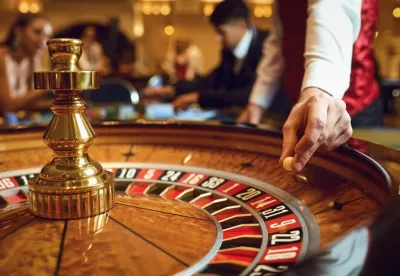A shimmering jewel in the crown of one of the most naturally beautiful corners of Southern Africa, Lake Malawi’s great expanse of fresh water stretches across approximately one fifth of the country, providing in many ways the lifeblood of this tiny nation. Ebbing and flowing into every part of Malawian life, the Lake brings sustenance, livelihood, tourism and leisure and forms an integral part of Malawi’s cultural heritage.
Sometimes known as the ‘Calendar Lake’ because it is 365 miles long and 52 miles wide qualifying an inland sea, Lake Malawi also borders Mozambique and Tanzania where it is known as Lake Nyassa.
The Lake Malawi National Park is the world’s first freshwater national park. The aquatic wonderland of Cape Maclear and its surrounding areas has earned a UNESCO World Heritage Site status, which encompasses the land around the cape and bay, as well as the Lake and islands up to 100 meters (330 ft) off shore.
Lake Malawi’s clear, calm, warm, shark-free and tide-less waters provide an opportunity for almost any water sport and the beautiful palm fringed shores and immaculate beaches make it a Mecca for those seeking an all-year round location to swim, scuba dive, snorkel, water-ski, sail, kayak, parasail or simply potter about in boats, and the salt-free water is a bonus.
Swimming with the fish is a favorite pastime in Lake Malawi; dubbed ‘God’s Aquarium’ it offers an incredible kaleidoscopic display of spectacular colored tropical fish. The lake is home to almost 1,000 species of fish around 80% of which cannot be found in any other lake in the world. The Cichlidae (cichlids) dominate and the lake is said to contain over thirty per cent of all known cichlid species. Among these are the small highly colored mbuna rock fish which frequently grace the aquariums of many a home in the western world.
The abundant fish populations have made the lake a global ‘hot-spot’ for studies of biodiversity, and it is also widely recognized as one of the best freshwater diving locations in the world with visibility reaching 30 m at the best times of year (August to December).
Some of the best diving is available at Danforth Yachting and Mumbo & Domwe Island camps at the Lake Malawi National Park (Cape Maclear). One to six day courses are available with professional tuition and PADI or NAUI certification. Alternatively, sailing tours can be taken to incorporate day or night dives.
Offering a rich fish harvest, the lake plays an important part in the economy. Fishing villages are scattered along the shore and the traditional industry and practices are also an attraction to visitors. Fishing is a very popular pursuit with tourists, and local fishermen will usually be pleased to help hire a boat and provide expert advice.
For sailing enthusiasts the Lake Malawi Yachting Marathon takes places every July. Often described as the longest freshwater yachting race in the world (over 500 km), this event is not for the faint hearted sailor. It is during July that the mwera blows strongest up Lake Malawi from Mozambique, creating some very rough water and challenging conditions.
The event has grown steadily in popularity with yachts and crews, from all over southern Africa and further participating every year. Starting at one of the resorts dotting the southern lakeshore, the event takes entrants northwards and across to the islands of Malawian islands of Likoma and Chisimulu, within Mozambican waters and ends on the beautiful silver sands of Chintheche just south of Nkhata Bay.
Many of Malawi’s most high profile events take place on the Lake’s palm fringed shores, including the Lake of Stars – an internationally renowned music festival which now forms part of the global festival circuits. Lake of Stars features over 70 acts including the very best of Malawian music along with everything from Indie, Kwaito, Reggae and Dubstep.
There is a good range of accommodation along the lakeshore, with excellent lodges expertly placed for guests to enjoy the areas of outstanding natural beauty. Between Mangochi and Monkey Bay is a long line of wonderful beaches with a wide variety of accommodation. The Mangochi Lakeshore has the Lake’s largest concentration of lodges and hotels, varying from sophisticated properties, with golf course and airstrip, to more simple resorts.
Senga Bay is another place where there are a number of quality lodges & hotels, and it benefits from being the closest point on the lake to Lilongwe. The stretch between the historic Nkhotakota and the sugar estate town of Dwangwa has a smattering of lodges, and another concentration is found on the Chintheche lakeshore, which has some stunning beaches. Two of the most popular Lake resorts are The Makokola Retreat and Sunbird Nkopola Lodge.
Cape Maclear boasts an excellent choice of accommodation including Mumbo & Domwe Island Camps, Danforth Yachting and Lodge, Cape Mac Lodge and Pumulani, Robin Pope Safaris. Most accommodation is easily accessible to the beaches and offers a wide range of activities on the lake.
Whether guests choose a stay that is relaxed, or action packed – locals will agree the perfect way to round off a day at Lake Malawi is with a ‘swim downer’ – many establishments provide floats enabling visitors to enjoy the waters and the spectacular sunsets with their favorite tipple, or a taste of some specialty Malawian gin.
By Kelly White (Malawi Travel Marketing Consortium)
malawitourism.com

